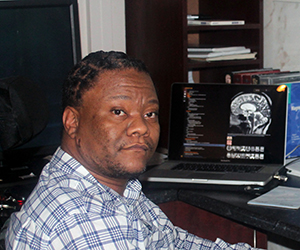Latest News Archive
Please select Category, Year, and then Month to display items
29 August 2024
|
Story Anthony Mthembu
|
Photo Harmse Photography
 Ross van Reenen, CEO of the Toyota Free State Cheetahs.
Ross van Reenen, CEO of the Toyota Free State Cheetahs.
The Business School at the University of the Free State (UFS) recently hosted the CEO of the Toyota Free State Cheetahs, Ross van Reenen, for a guest lecture. Van Reenen presented the guest lecture in the Business School Auditorium on the UFS Bloemfontein Campus on 21 August 2024.
Reflecting on Van Reenen’s address
In a lecture addressed to an auditorium filled with UFS staff and students, Van Reenen’s talk was divided into several sections. Firstly, he spoke about the concept of the ‘black swan’ in reference to the book written by Nassim Nicholas Taleb, titled The Black Swan: The Impact of the Highly Improbable. Referring to Taleb’s book, Van Reenen defined a ‘black swan’ as a rare event that has a severe impact, and the occurrence of which people try to explain. He used some examples to explore this concept as well as its implications, including COVID-19 and its impact on the world, and the tragic death of the people in the Titanic disaster. However, he delved deeper into 9/11 and the extent of its impact, saying that “9/11 was a major wake-up call in the world economy”. Van Reenen highlighted how some companies such as Barclays, for which he previously consulted, had to work to be up and running after the collapse of the Twin Towers in 9/11.
In addition, Van Reenen’s lecture also touched on the importance of the first ninety days of a job after an individual has been employed. “Those first ninety days are crucial, as you have to establish yourself in a company where you are paid less than you are worth,” Van Reenen said. As such, he gave the audience insight into what they could focus on in that time frame. This includes focusing on the small wins, as well as ensuring that you are working at keeping the team together, as the team is an integral part of an organisation.
Van Reenen concluded his address by speaking about his time as the CEO of the Toyota Free State Cheetahs, including some of the decisions he took to ensure the success of the organisation.
Quadriplegic doctor obtains degree against all odds
2016-11-25

Dr Swartbooi faces each day with vigour and
resilience. Dr Swartbooi analyses images on
a screen in the Clinical Imaging Laboratory
at Universitas Academic Hospital.
Photo: Oteng Mpete
Life’s defining moments are when perseverance is rewarded. It is not easy to swim against the tide. However, for Dr Ambrotius Swartbooi from the University of the Free State’s Department of Clinical Imaging Sciences, it became his moment of glory. In 2006, Dr Swartbooi suffered a spinal injury from a near-fatal car accident which left him paralysed and a quadriplegic.
The strength to carry on
“You have one of two choices:
to lie down and give up,
or to pick yourself up”
—Dr Swartbooi
Dr Swartbooi spent close to six months, recovering from his injuries. “You have one of two choices: to lie down and give up or to pick yourself up,” said Dr Swartbooi. He would inspire other patients with similar injuries to reintegrate into society despite their new-found circumstances.
Fortunately, not all was doom and gloom; in 2007 Dr Swartbooi got married, and his wife has supported and inspired him to continue pursuing his dreams. Dr Swartbooi completed his undergraduate medical degree at the UFS, and in 2014 decided it was time to complete his studies and pursued an MMed specialising in Diagnostic Radiology.
To treat or not treat: that is the question
After all his trials and tribulations, Dr Swartbooi will be receiving his MMed Diagnostic Radiology degree at the UFS Summer Graduation ceremony in December 2016. His research focuses on intracranial aneurysm size interventions. He discovered that there were discrepancies between international standards for intervention and African standards for intervention.
The research inspects what should be treated and how it should be treated. He found there was a gap in African literature into the size of aneurysms.
Champion of survival: Where to from here?
“That’s a good question,” said Dr Swartbooi. “Slowly from here. I still need to work on getting my full accreditation from the Health Professions Council of South Africa (HPCSA).” He plans to continue fuelling his passion for teaching. “There is no place better to teach than at an academic hospital.”
Dr Swartbooi commended the efforts of the Centre for Universal Access and Disability Support (CUADS), which assisted him in writing all his exams. “I want to be able to make a fulfilling and lasting impact on people but also to give the best medical service that I can,” concluded Dr Swartbooi.